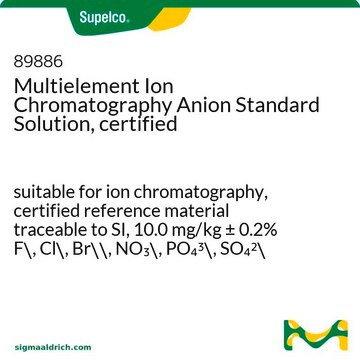73664
Mettler-Toledo Calibration substance ME 18870, Benzophenone
traceable to primary standards (LGC)
Synonym(s):
Benzophenone, Diphenyl ketone, Diphenylmethanone, NSC 8077
About This Item
Recommended Products
grade
analytical standard
for the calibration of the thermosystem 900
Quality Level
vapor pressure
1 mmHg ( 108 °C)
quality
traceable to primary standards (LGC)
shelf life
limited shelf life, expiry date on the certificate and label
bp
305 °C (lit.)
mp
47-51 °C (lit.)
application(s)
food and beverages
pharmaceutical
format
neat
SMILES string
O=C(C1=CC=CC=C1)C2=CC=CC=C2
InChI
1S/C13H10O/c14-13(11-7-3-1-4-8-11)12-9-5-2-6-10-12/h1-10H
InChI key
RWCCWEUUXYIKHB-UHFFFAOYSA-N
Looking for similar products? Visit Product Comparison Guide
General description
Application
Features and Benefits
- Melting point calibration standard traceable to a primary standard from LGC, London
- Melting point evaluation performed in both thermodynamic and pharmacopeia modes for physically correct and heating rate dependent melting point determinations, respectively
- Available with certificates of analysis and safety data sheet
- A product of analytical standard grade to help meet the QC/QA requirements of melting point determination
Signal Word
Danger
Hazard Statements
Precautionary Statements
Hazard Classifications
Aquatic Chronic 3 - Carc. 1B - STOT RE 2 Oral
Target Organs
Liver,Kidney
Storage Class Code
6.1C - Combustible acute toxic Cat.3 / toxic compounds or compounds which causing chronic effects
WGK
WGK 1
Flash Point(F)
280.4 °F - closed cup
Flash Point(C)
138 °C - closed cup
Personal Protective Equipment
Choose from one of the most recent versions:
Already Own This Product?
Find documentation for the products that you have recently purchased in the Document Library.
Customers Also Viewed
Our team of scientists has experience in all areas of research including Life Science, Material Science, Chemical Synthesis, Chromatography, Analytical and many others.
Contact Technical Service












